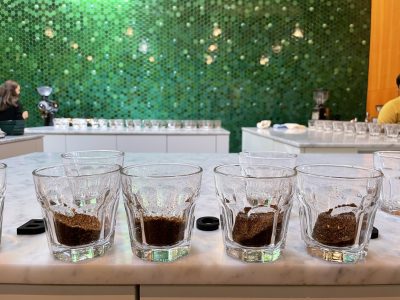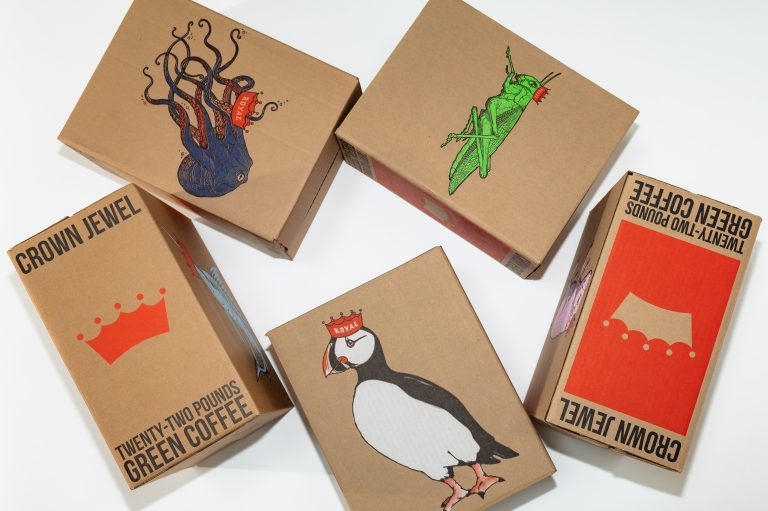The Crown is hosting the Q Arabica Combo.
Becoming a Q Arabica Grader is one of the highest honors in the coffee industry. Serious study and practice are required to hone your sensory skills to the level needed to pass the battery of tests in the Q Arabica curriculum. No doubt finishing the course gives you a sense of accomplishment, but as with all things in life, where do you go next?
The paths you can take in coffee are myriad, each one of them requiring years to master and regular practice to maintain skill. With a rigorous exam like this one, you’re ready to take on any number of these positions. This is just the beginning!
Paths in the Coffee Industry
Quality Control
Perhaps the most direct career path is to a Quality Control position. Many Q Graders I have met found their way to Quality Control positions throughout the industry, whether for the green procurement or production roasting side of a large coffee company, for importers or green coffee purveyors, or for ready-to-drink beverage manufacturers.
Green Coffee Sales
Caitlin McCarthy-Garcia, a coworker and fellow Q Grader, related her experience. “As a Q-grader for the past 11 years, and having calibrated three different times, I feel confident in my quality assessment in the various jobs I have held in the coffee industry. In a trading role, I communicate back to origin with the same language and protocols as to my clients, and bring a consistent accuracy and clarity to the process.” Sharing a common language across the industry is a valuable aspect of this program, and helps everyone advance their careers.
Teaching and Consulting
Another possible route is the academic pathway: to become an educator yourself. Conveying the skills you’ve gained in this coursework to other people is a logical next step, and CQI offers further education on a number of topics related to coffee production that culminate in the student becoming the instructor. If you’ve ever felt awe and respect for a teacher, consider becoming one yourself.
Further, the learning doesn’t have to stop at Q Arabica Grader certification. Even teachers are constantly learning, and expanding on the courses available from CQI gives you more inroads to different portions of the industry. Very broadly, the Post-harvest Processing curriculum gives students a greater understanding of how the fruit of the coffee shrub is made ready for export, from best practices to more complex topics like yeast inoculation. This curriculum allows for more informed dialog with producers if you’re mainly working with green coffee, and an internationally understood set of terms and techniques if you’re a producer yourself. All of this in service of improving coffee quality and improving people’s lives through market access and communication, across the globe.
Again, coffee is an endless fascinating topic; we wouldn’t be talking about it otherwise. The more we learn about this crop, the more there is to unveil just below the surface of our current understanding. Certainly one can become a master of coffee knowledge, but the depth of the field is humbling when taking a closer look. That said, when you become well versed in a number of topics, people may value your knowledge and prior experience enough to bring you on as a consultant. Starting your own private coffee consultation service is a big step, but one that allows you to be your own boss and decide which clients you’ll take.
One way the Q Arabica Course helps you achieve this goal is by introducing you to a number of other coffee industry professionals with similar outlooks and goals. The networking aspect of attending a Q Arabica course shouldn’t be overlooked, and can’t be oversold. In this course you’ll be surrounded by your peers in the industry, and getting through the experience together leads to incredible bonds.
Another way is by showing you a clear method for conveying relevant information through education materials. Using these as an example, one could craft their own curriculum specifically to fit the needs of various clients, based on your specific knowledge. And with one didactic method already in your pocket, it becomes easier to see how to tailor one to suit your own needs. Each teacher has something unique to offer!
Outside the Industry
Many of the skills you’ll gain through the CQI curriculum translate well to many different food industry positions. Quality control and sensory analysis is important for any food company, from olive oil and honey to ice cream and beef jerky, to name a few. Consistency and food safety are important to anyone producing food, and sensory analyses are essential in maintaining both.
Panels of professional tasters are needed to refine the flavor profiles of products going to market, and to maintain the quality of products that are already well established. Food industry specialists can even include people who monitor the processing of raw goods like malting barley, drying corn, and the handling of many other goods with similar profiles to the seed we know as coffee.
Product development is another area where sensory acuity and training is an essential job skill. Tasting critically is not, and never was limited to just coffee when you got your Q. Ever wonder why your favorite snack company came out with a wacky peach-lemon-ginger kombucha flavored popcorn, and why it actually tastes good despite initial misgivings? Someone had to refine that flavor profile, and you can be sure that it didn’t taste good on the first try. That someone can be you.
And Beyond…
There’s no saying that your newfound certification and connoisseurship has to be limited to the vocational. You can taste critically for your own pleasure. If you’re just an ambitious student of life out there to gain new skills, there’s no saying you can’t take the Q for Q’s sake.
After all, this is about improving your knowledge, and there can be a certain satisfaction in knowing that you have the skills needed to determine coffee quality from as rigorous a standpoint as someone in the industry.


